Unit 1 My day Part A Let's try and Let's talk 课件(共48张PPT)
文档属性
| 名称 | Unit 1 My day Part A Let's try and Let's talk 课件(共48张PPT) |  | |
| 格式 | pptx | ||
| 文件大小 | 17.2MB | ||
| 资源类型 | 教案 | ||
| 版本资源 | 人教版(PEP) | ||
| 科目 | 英语 | ||
| 更新时间 | 2023-01-31 18:02:12 | ||
图片预览

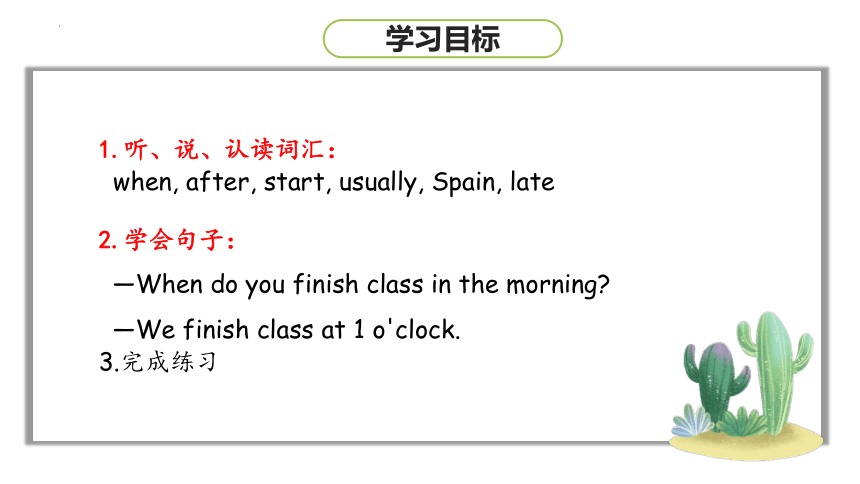


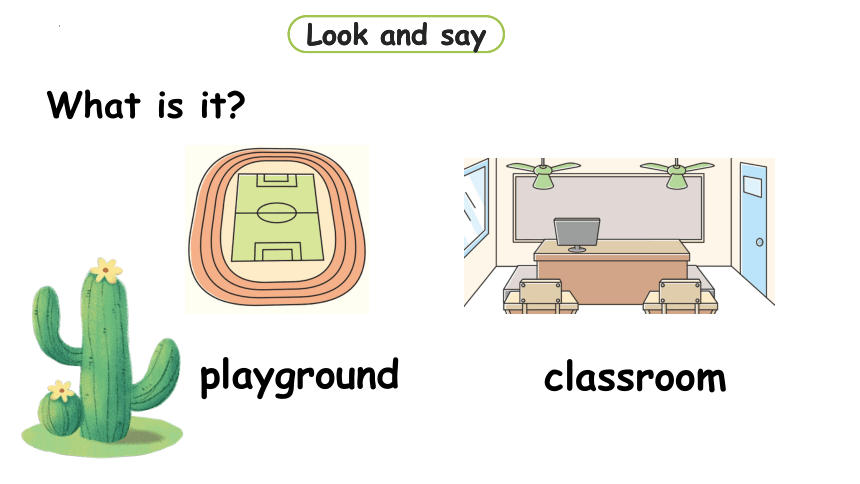

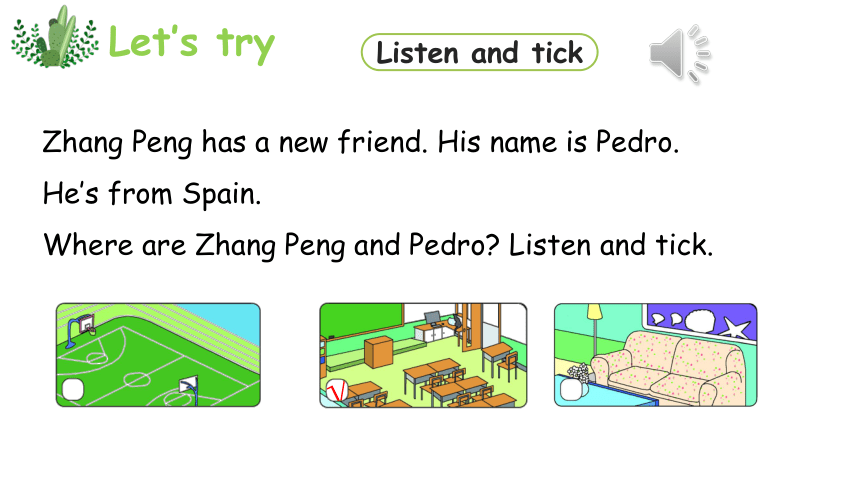
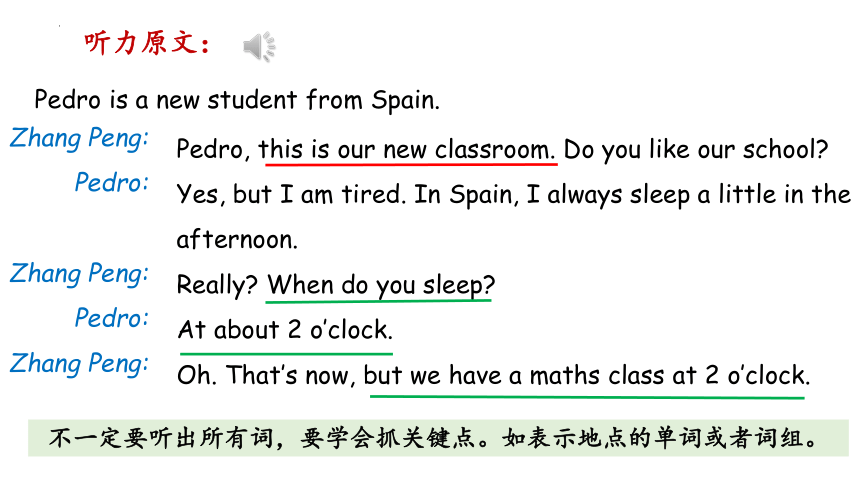
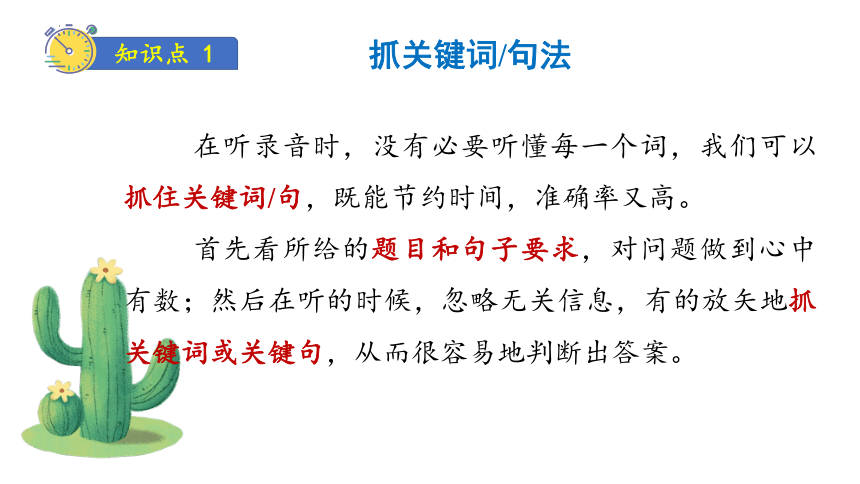
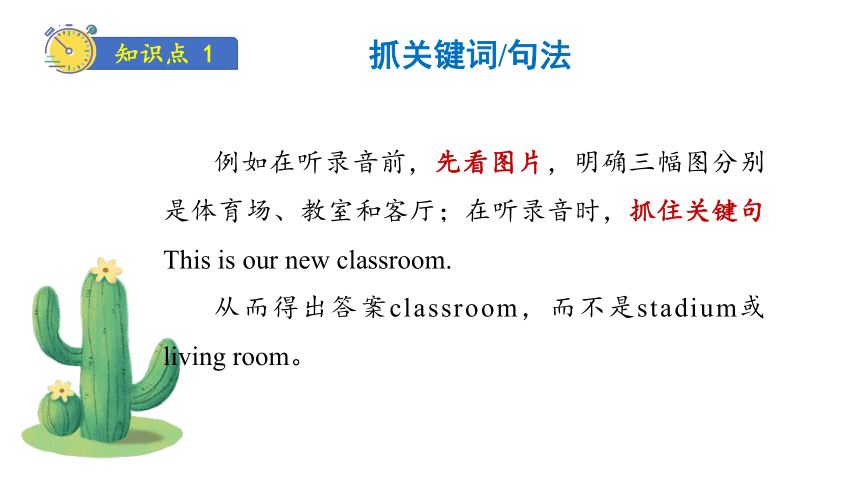

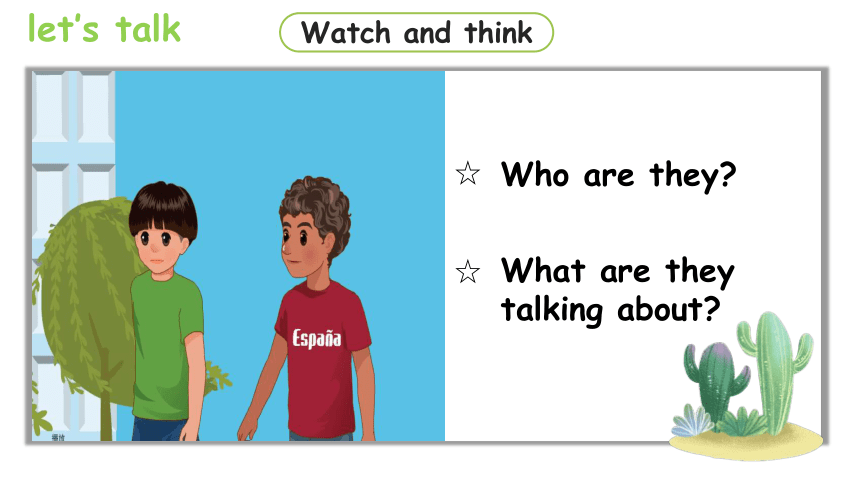
文档简介
(共48张PPT)
My Day
part A Let’s try & Let’s talk
五下英语课本P4页
学习目标
1.听、说、认读词汇:
when, after, start, usually, Spain, late
2.学会句子:
—When do you finish class in the morning
—We finish class at 1 o'clock.
3.完成练习
目录
CONTENTS
01 Let’s try
02 Let’s talk
03 New word
04 Practice
PART ONE
01
Let’s try
Look and say
Look and say
What is it
playground
classroom
Look and say
Look and say
What is it
living room
bedroom
Let’s try
Listen and tick
√
Zhang Peng has a new friend. His name is Pedro.
He’s from Spain.
Where are Zhang Peng and Pedro Listen and tick.
Zhang Peng:
Pedro:
Zhang Peng:
Pedro:
Zhang Peng:
Pedro, this is our new classroom. Do you like our school
Yes, but I am tired. In Spain, I always sleep a little in the afternoon.
Really When do you sleep
At about 2 o’clock.
Oh. That’s now, but we have a maths class at 2 o’clock.
听力原文:
不一定要听出所有词,要学会抓关键点。如表示地点的单词或者词组。
Pedro is a new student from Spain.
在听录音时,没有必要听懂每一个词,我们可以抓住关键词/句,既能节约时间,准确率又高。
首先看所给的题目和句子要求,对问题做到心中有数;然后在听的时候,忽略无关信息,有的放矢地抓关键词或关键句,从而很容易地判断出答案。
知识点 1
抓关键词/句法
知识点 1
抓关键词/句法
例如在听录音前,先看图片,明确三幅图分别是体育场、教室和客厅;在听录音时,抓住关键句This is our new classroom.
从而得出答案classroom,而不是stadium或living room。
PART TWO
02
Let’s talk
Watch and think
let’s talk
Who are they
What are they talking about
Watch and think
Who are they
They are Zhang Peng and Pedro.
What are they talking about
They are talking about their daily routines.(日常)
let’s talk
Let’s talk
Read and think阅读并思考
get up at 7 o’clock
start class
finish class in the morning
go back to school after lunch
start class in the afternoon
eat dinner
Pedro’s Timetable(时间表)
Now read let’s talk and answer the question.
get up at 7 o’clock
start class at 9 o’clock
finish class in the morning
go back to school after lunch
start class in the afternoon
eat dinner
at 3 o’clock
at 9:30 or 10 o’clock
Pedro’s Timetable(时间表)
at 1 o’clock
at 2:30
Check your answers检查答案
let’s talk
When do you finish class in the morning
We finish class at 1 o'clock.
新知讲解
let’s talk
in和at的辨析
let’s talk
具体钟点前面需要加介词at。
at ten o'clock 在十点。
at ten thirty 在十点半。
在morning, afternoon,和 evening前面需要加介词in。
in the morning 在早晨
in the afternoon 在中午
in the evening 在晚上
询问他人的作息时间安排及回答的句型
句型结构为“When do you +动词(短语)原形+其他?” 对某一动作发生的时间进行提问。
答句为“I / We (+频度副词) +动词(短语)原形+at+具体的时间.”
口语中也可以用“At+具体的时间.”来回答。
when引导的特殊疑问句
考向
新知讲解
新知讲解
例句:—When do you do homework
你什么时候做作业?
—I (usually) do my homework at five o'clock.
我(通常) 在五点钟做作业。
易错点
提示
在具体的时刻前通常用介词at。
频率副词
let’s talk
Sunday Monday Tuesday Wednesday Thursday Friday Saturday
I do sports.
I play ping pong.
I go swimming.
I play football.
always
usually
often
sometimes
I play basketball.
never
频率副词
let’s talk
Mon. Tues. Wed. Thur. Fri. Sat. Sun.
always
usually
often
sometimes
never
0% 50 % 100%
never
sometimes
always
usually
often
从不
有时候
经常
通常
一直
频率副词
let’s talk
I read books at school.
I clean my room after dinner.
I go for a walk in a park .
I watch TV on the weekend.
I do kung fu in the gym .
sometimes
usually
often
never
always
频率副词
let’s talk
I sometimes watch TV.
Sometimes I watch TV.
I watch TV sometimes.
sometimes可以放在句首,句中和句末。
usually可以放在句首和句中。
often放在句首时表示强调作用。
Always
let’s talk
1.Always常用于行为动词前、be动词后,强调动作的连续性。常用于一般现在时,也可用于进行时态当中(往往含有赞扬或批评等感情鱼彩)。
I always go to walk on weekends.我总是在周末出去散步。
usually
let’s talk
2.Usually意为“通常”,常常修饰一种习惯性的行为。
I usually drink a cup of water in the morning
我通常早上喝一杯水。
频率副词
let’s talk
3.Often意为“常常”,表示动作有间断,常用于行为动词前、be动词后,有时加强语气可放于句首或句末。He often goes to the cinema.他经常去那家电影院。
频率副词
let’s talk
4. Sometimes意为“有时、不时、间或”,频率低于often。
Sometimes she drinks coffee in the afternoon.
有时她在下午喝咖啡。
PART ONE
03
new word
new word
同义短语:what time 什么时候
when /wen/ adv.什么时候;何时
When do you go to school
你什么时候去上学?
拆拼记忆法:
w+hen(母鸡)=when(什么时候,何时)
考向
When do you go back to school after lunch
new word
after /'ɑ ft / prep.在……之后
After dinner I often listen to music.
晚饭后,我经常听音乐。
反义词:before 在……之前
短语:after lunch 午饭后 after class下课后
after school 放学后 after work下班后
考向
When do you go back to school after lunch
new word
start /stɑ t/ v.开始
The basketball match starts at 2 o’clock.
篮球比赛两点钟开始。
Classes start at 3 o'clock.
new word
usually /'ju u li/ adv.通常地;惯常地
用法:表示做事的频率,在句中放在实义动词的前面,系动词和助动词之后,也可以放在句首。
I usually eat eggs for lunch.
我通常午饭吃鸡蛋。
考向
When do you usually eat dinner in Spain
Spain
西班牙
新知讲解
选出错误的一项,并改正。
( ) What do you do usually on the weekend
____________
B
usually do
A
B
C
典例
new word
late /le t/ adj. 晚;迟
对应词:early早的
It’s time for school. Don’t be late.
是上学的时候了,不要迟到。
短语:be late for 做……迟到
考向
拓展
That's too late !
after
start
usually
Spain
after
Spain
usually
late
点击单词开始
Let’s play
Role play
四人一组,自选头饰,分别扮演司机、厨师、篮球运动员、医生等角色。相互问答对方的生活作息时间。
PART ONE
04
Practice
练习检测
一、单项选择。
(1) —_______ do you usually read books in the evening
—Usually at 7:30.
A.Where B.When C.Who
B
点拨:
由回答 “Usually at 7:30.”可知询问的是时间,提问时间用when。
练习检测
(2) I usually have English _______ 2 o'clock on Friday.
A.on B.In C.At
(3) We usually go back _______ the library at 2 o'clock.
A.in B.On C.to
C
点拨:
表示“在几点”用介词at,故选C。
点拨:
go back to ...表示“回到(某地)”,故选C。
C
练习检测
二、选词填空。
(1) What do you do ________ lunch
(2) My sister ________ eats lunch at 11:30.
(3) ________ do you get up
(4) Do you ________ class at 4:30 p.m.
after
usually
When
finish
when finish after usually
练习检测
三、判断句子是(T)否(F)与图片情景相符。
( ) (1) We start class at eight o'clock.
( ) (2) I usually eat lunch at home.
( ) (3)She is late for class.
T
F
T
课堂小结
本节课我们学习了以下知识,请同学们一定加强巩固,以便能和同学们进行灵活交流哦!
(听、说、认读)词汇:
when, after, start, usually, Spain, late
句子:
—When do you finish class in the morning
—We finish class at 1 o'clock.
课堂小结
如何询问对方的作息时间 : When do you…
例句:
Zhang Peng : When do you finish class in the morning
Pedro : We finish class at 1 o’clock.
当你想询问对方的作息时间时,可以用when 引导的特殊疑问句
课堂小结
句型分析:
问句: When do you + 动词原形( + 其他)
答语: I/ We ( + 频度副词) + 动词(短语)原形 +at + 具体时间
eg: —When do you go to school
—I go to school at 7:30.
课堂小结
School schedules are different in different countries.
不同国家有不同的学校作息时间。
背诵本节课的6个单词和A部分Let’s talk.
完成本节课练习题
01
02
Homework
感谢观看
My Day
part A Let’s try & Let’s talk
五下英语课本P4页
学习目标
1.听、说、认读词汇:
when, after, start, usually, Spain, late
2.学会句子:
—When do you finish class in the morning
—We finish class at 1 o'clock.
3.完成练习
目录
CONTENTS
01 Let’s try
02 Let’s talk
03 New word
04 Practice
PART ONE
01
Let’s try
Look and say
Look and say
What is it
playground
classroom
Look and say
Look and say
What is it
living room
bedroom
Let’s try
Listen and tick
√
Zhang Peng has a new friend. His name is Pedro.
He’s from Spain.
Where are Zhang Peng and Pedro Listen and tick.
Zhang Peng:
Pedro:
Zhang Peng:
Pedro:
Zhang Peng:
Pedro, this is our new classroom. Do you like our school
Yes, but I am tired. In Spain, I always sleep a little in the afternoon.
Really When do you sleep
At about 2 o’clock.
Oh. That’s now, but we have a maths class at 2 o’clock.
听力原文:
不一定要听出所有词,要学会抓关键点。如表示地点的单词或者词组。
Pedro is a new student from Spain.
在听录音时,没有必要听懂每一个词,我们可以抓住关键词/句,既能节约时间,准确率又高。
首先看所给的题目和句子要求,对问题做到心中有数;然后在听的时候,忽略无关信息,有的放矢地抓关键词或关键句,从而很容易地判断出答案。
知识点 1
抓关键词/句法
知识点 1
抓关键词/句法
例如在听录音前,先看图片,明确三幅图分别是体育场、教室和客厅;在听录音时,抓住关键句This is our new classroom.
从而得出答案classroom,而不是stadium或living room。
PART TWO
02
Let’s talk
Watch and think
let’s talk
Who are they
What are they talking about
Watch and think
Who are they
They are Zhang Peng and Pedro.
What are they talking about
They are talking about their daily routines.(日常)
let’s talk
Let’s talk
Read and think阅读并思考
get up at 7 o’clock
start class
finish class in the morning
go back to school after lunch
start class in the afternoon
eat dinner
Pedro’s Timetable(时间表)
Now read let’s talk and answer the question.
get up at 7 o’clock
start class at 9 o’clock
finish class in the morning
go back to school after lunch
start class in the afternoon
eat dinner
at 3 o’clock
at 9:30 or 10 o’clock
Pedro’s Timetable(时间表)
at 1 o’clock
at 2:30
Check your answers检查答案
let’s talk
When do you finish class in the morning
We finish class at 1 o'clock.
新知讲解
let’s talk
in和at的辨析
let’s talk
具体钟点前面需要加介词at。
at ten o'clock 在十点。
at ten thirty 在十点半。
在morning, afternoon,和 evening前面需要加介词in。
in the morning 在早晨
in the afternoon 在中午
in the evening 在晚上
询问他人的作息时间安排及回答的句型
句型结构为“When do you +动词(短语)原形+其他?” 对某一动作发生的时间进行提问。
答句为“I / We (+频度副词) +动词(短语)原形+at+具体的时间.”
口语中也可以用“At+具体的时间.”来回答。
when引导的特殊疑问句
考向
新知讲解
新知讲解
例句:—When do you do homework
你什么时候做作业?
—I (usually) do my homework at five o'clock.
我(通常) 在五点钟做作业。
易错点
提示
在具体的时刻前通常用介词at。
频率副词
let’s talk
Sunday Monday Tuesday Wednesday Thursday Friday Saturday
I do sports.
I play ping pong.
I go swimming.
I play football.
always
usually
often
sometimes
I play basketball.
never
频率副词
let’s talk
Mon. Tues. Wed. Thur. Fri. Sat. Sun.
always
usually
often
sometimes
never
0% 50 % 100%
never
sometimes
always
usually
often
从不
有时候
经常
通常
一直
频率副词
let’s talk
I read books at school.
I clean my room after dinner.
I go for a walk in a park .
I watch TV on the weekend.
I do kung fu in the gym .
sometimes
usually
often
never
always
频率副词
let’s talk
I sometimes watch TV.
Sometimes I watch TV.
I watch TV sometimes.
sometimes可以放在句首,句中和句末。
usually可以放在句首和句中。
often放在句首时表示强调作用。
Always
let’s talk
1.Always常用于行为动词前、be动词后,强调动作的连续性。常用于一般现在时,也可用于进行时态当中(往往含有赞扬或批评等感情鱼彩)。
I always go to walk on weekends.我总是在周末出去散步。
usually
let’s talk
2.Usually意为“通常”,常常修饰一种习惯性的行为。
I usually drink a cup of water in the morning
我通常早上喝一杯水。
频率副词
let’s talk
3.Often意为“常常”,表示动作有间断,常用于行为动词前、be动词后,有时加强语气可放于句首或句末。He often goes to the cinema.他经常去那家电影院。
频率副词
let’s talk
4. Sometimes意为“有时、不时、间或”,频率低于often。
Sometimes she drinks coffee in the afternoon.
有时她在下午喝咖啡。
PART ONE
03
new word
new word
同义短语:what time 什么时候
when /wen/ adv.什么时候;何时
When do you go to school
你什么时候去上学?
拆拼记忆法:
w+hen(母鸡)=when(什么时候,何时)
考向
When do you go back to school after lunch
new word
after /'ɑ ft / prep.在……之后
After dinner I often listen to music.
晚饭后,我经常听音乐。
反义词:before 在……之前
短语:after lunch 午饭后 after class下课后
after school 放学后 after work下班后
考向
When do you go back to school after lunch
new word
start /stɑ t/ v.开始
The basketball match starts at 2 o’clock.
篮球比赛两点钟开始。
Classes start at 3 o'clock.
new word
usually /'ju u li/ adv.通常地;惯常地
用法:表示做事的频率,在句中放在实义动词的前面,系动词和助动词之后,也可以放在句首。
I usually eat eggs for lunch.
我通常午饭吃鸡蛋。
考向
When do you usually eat dinner in Spain
Spain
西班牙
新知讲解
选出错误的一项,并改正。
( ) What do you do usually on the weekend
____________
B
usually do
A
B
C
典例
new word
late /le t/ adj. 晚;迟
对应词:early早的
It’s time for school. Don’t be late.
是上学的时候了,不要迟到。
短语:be late for 做……迟到
考向
拓展
That's too late !
after
start
usually
Spain
after
Spain
usually
late
点击单词开始
Let’s play
Role play
四人一组,自选头饰,分别扮演司机、厨师、篮球运动员、医生等角色。相互问答对方的生活作息时间。
PART ONE
04
Practice
练习检测
一、单项选择。
(1) —_______ do you usually read books in the evening
—Usually at 7:30.
A.Where B.When C.Who
B
点拨:
由回答 “Usually at 7:30.”可知询问的是时间,提问时间用when。
练习检测
(2) I usually have English _______ 2 o'clock on Friday.
A.on B.In C.At
(3) We usually go back _______ the library at 2 o'clock.
A.in B.On C.to
C
点拨:
表示“在几点”用介词at,故选C。
点拨:
go back to ...表示“回到(某地)”,故选C。
C
练习检测
二、选词填空。
(1) What do you do ________ lunch
(2) My sister ________ eats lunch at 11:30.
(3) ________ do you get up
(4) Do you ________ class at 4:30 p.m.
after
usually
When
finish
when finish after usually
练习检测
三、判断句子是(T)否(F)与图片情景相符。
( ) (1) We start class at eight o'clock.
( ) (2) I usually eat lunch at home.
( ) (3)She is late for class.
T
F
T
课堂小结
本节课我们学习了以下知识,请同学们一定加强巩固,以便能和同学们进行灵活交流哦!
(听、说、认读)词汇:
when, after, start, usually, Spain, late
句子:
—When do you finish class in the morning
—We finish class at 1 o'clock.
课堂小结
如何询问对方的作息时间 : When do you…
例句:
Zhang Peng : When do you finish class in the morning
Pedro : We finish class at 1 o’clock.
当你想询问对方的作息时间时,可以用when 引导的特殊疑问句
课堂小结
句型分析:
问句: When do you + 动词原形( + 其他)
答语: I/ We ( + 频度副词) + 动词(短语)原形 +at + 具体时间
eg: —When do you go to school
—I go to school at 7:30.
课堂小结
School schedules are different in different countries.
不同国家有不同的学校作息时间。
背诵本节课的6个单词和A部分Let’s talk.
完成本节课练习题
01
02
Homework
感谢观看
